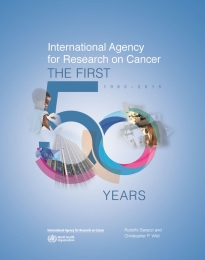
978-92-832-0440-4
978-92-832-0441-1
978-92-832-0444-2
Since its creation in 1965 as the specialized cancer agency of the World Health Organization, the International Agency for Research on Cancer (IARC) has conducted research worldwide and helped thousands of cancer researchers from developing countries hone their skills through fellowships, courses, and collaborative projects. This book charts the birth of IARC during the 1960s – a period of great optimism for international cooperation and medical science. It goes on to describe the Agency’s major achievements over the past five decades in terms of the development of tools for conducting cancer research, the identification of risk factors, and the evaluation of preventive interventions. By examining IARC’s history, the authors illustrate how, despite the changing landscape of cancer research, the original vision continues to be a valid response to the needs for cancer prevention and control worldwide. This is ever more the case as the disease burden falls more heavily on developing countries, and international collaborative studies are increasingly relied upon to address national priorities for cancer control.
Cover page
Table of contents
Foreword, About this book, About the authors, Acknowledgements
The birth of IARC
1965 to 2015: IARC, a unique institution for a changing world
Education and training of cancer researchers
Innovation in statistical methods
Cancer registries: a worldwide endeavour
Cancer patterns, trends, and burden
Carcinogens in the human environment
Nutrition, metabolism, and cancer
From laboratory to population
Viruses and vaccines
Cancer screening and early diagnosis
IARC: the second 50 years
Further reading, Sources, IARC Directors and Council chairs, Enabling research success
List of corrections